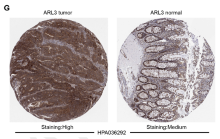Piperine inhibits the proliferation of colorectal adenocarcinoma by regulating ARL3-mediated endoplasmic reticulum stress
DOI:
https://doi.org/10.17305/bb.2024.10525Keywords:
Piperine, ARL3, endoplasmic reticulum (ER), colorectal adenocarcinoma (COAD), proliferationAbstract
Colorectal adenocarcinoma (COAD) is a significant cause of cancer-related mortality worldwide, necessitating the identification of novel therapeutic targets and treatments. This research aimed to investigate the role of ARL3 in COAD progression and to explore the effects of Piperine on ARL3 expression, cell proliferation, epithelial–mesenchymal transition (EMT), and endoplasmic reticulum (ER) stress. Bioinformatics analysis of The Cancer Genome Atlas (TCGA)–COAD, GSE39582, and GSE44861 datasets assessed ARL3 expression levels. Immunohistochemical data from the Human Protein Atlas (HPA) database confirmed ARL3 overexpression in COAD. The association of ARL3 with COAD clinical parameters and prognosis was also examined. COAD cells were treated with Piperine, and in vitro assays evaluated cell proliferation, apoptosis, EMT marker expression, and ER stress (ERS) responses. ARL3 overexpression in COAD correlated with poor prognosis and varied across pathological stages. Piperine treatment inhibited COAD cell proliferation in a concentration- and time-dependent manner, as indicated by reduced Ki-67 levels and decreased colony-forming ability. Piperine induced S-phase cell cycle arrest and facilitated apoptosis in COAD cells, evidenced by changes in Bax, Bcl-2, cleaved caspase-3, and cleaved Poly (ADP-ribose) polymerase (PARP) levels. Moreover, Piperine downregulated ARL3 expression in COAD cells, thereby suppressing transforming growth factor beta (TGF-β)-induced EMT. Additionally, Piperine attenuated the ARL3-mediated ER stress response, significantly reducing binding immunoglobulin protein (BiP), inositol-requiring enzyme 1 alpha (p-IRE1α), activating transcription factor 6 (ATF6), and C/EBP homologous protein (CHOP) levels. Piperine exerts anti-cancer effects in COAD by modulating ARL3 expression, disrupting cell cycle progression, inhibiting the EMT pathway, and regulating ERS. These findings suggest that Piperine holds promise as a therapeutic agent for COAD through its targeting of ARL3.
Citations
Downloads

Downloads
Published
Data Availability Statement
The datasets used and/or analyzed during the current study are available from the corresponding author on reasonable request.
Issue
Section
Categories
License
Copyright (c) 2024 Chenqu Wu, Yanqing Qian, Jun Jiang, Deming Li, Li Feng

This work is licensed under a Creative Commons Attribution 4.0 International License.









